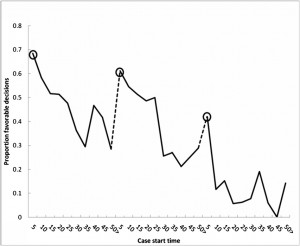Lunchtime Can Tip the Scales of Justice
Lawyers frequently have to explain to clients the myriad reasons why their cases didn’t go as expected. In any given civil or criminal case, there are usually a range of legal factors to consider, many beyond the control of the parties.
But what about non-legal factors? A new study published in Proceedings of the National Academy of Sciences (PNAS), suggests that these non-legal factors matter more than you might think. Impressively, the study concludes that a significant factor in getting a favorable decision is when the judge last had a lunch break.
The study surveyed 1,000 parole decisions of eight Israeli judges over ten months. In each case the judge could either grant or deny parole. Judges were far more likely to grant parole at the beginning of the day. They were also more likely to grant parole directly after lunch and a mid-afternoon break.
*Image taken from PNAS report, showing the proportion of favorable decisions over time.
Attorneys reported that they thought that factors like the severity of the crime and the amount of time served were likely to affect a judge’s decision to grant or deny parole. The data presented in this study demonstrates otherwise. Apparently, there is more of a correlation between the decision and when the case was heard, than whether the crime was severe.
The idea that external factors influence legal outcomes is not new. Legal realism, a philosophy of law that dates back to the 19th century, suggests that since humans are subject to whims, biases and external pressures, the legal system as a human construct is also subject to the same. In short, legal realism says, “a case turns on what the judge ate for breakfast.” Now, social science is validating that sentiment.
The authors of the study conclude that, as the judges become more fatigued, they are more likely to go with the easier choice–denying parole. And after rest periods, judges have more energy to go with the more difficult and time consuming choice–granting parole.
It’s well known that our courts are overtaxed in the United States. Judges of all sorts do their best to keep up with ever mounting caseloads. This study then, assuming the results can be generalized, points to a huge problem in our legal system. Cases should be decided on their merits, not on whether a judge has had a break recently.
All this leads to two pressing, though obvious, thoughts. First, we need to examine what else we can do to ensure that everyone actually gets a fair day in court. And second, it’s past time for Congress to finally give up the charade of judicial nomination blockades.



Comments